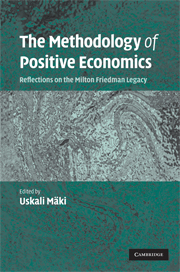Book contents
- Frontmatter
- Contents
- List of figures
- List of tables
- Contributors
- Preface
- Part 1 The classical essay in twentieth-century economic methodology
- Part 2 Reading and writing a classic
- Part 3 Models, assumptions, predictions, evidence
- 4 The influence of Friedman's methodological essay
- 5 Did Milton Friedman's positive methodology license the formalist revolution?
- 6 Appraisal of evidence in economic methodology
- 7 The politics of positivism: disinterested predictions from interested agents
- Part 4 Theoretical context: firm, money, expected utility, Walras and Marshall
- Part 5 Concluding perspectives
- Index
4 - The influence of Friedman's methodological essay
Published online by Cambridge University Press: 02 December 2009
- Frontmatter
- Contents
- List of figures
- List of tables
- Contributors
- Preface
- Part 1 The classical essay in twentieth-century economic methodology
- Part 2 Reading and writing a classic
- Part 3 Models, assumptions, predictions, evidence
- 4 The influence of Friedman's methodological essay
- 5 Did Milton Friedman's positive methodology license the formalist revolution?
- 6 Appraisal of evidence in economic methodology
- 7 The politics of positivism: disinterested predictions from interested agents
- Part 4 Theoretical context: firm, money, expected utility, Walras and Marshall
- Part 5 Concluding perspectives
- Index
Summary
Many leading methodologists have described the central role that Milton Friedman's 1953 essay (henceforth referred to as F53) has played in methodological discussions. (See, for instance, Hammond 1998; Hoover 2001; Backhouse 2002.) Yet Friedman himself did not intend his essay to be a contribution to methodology – about which he did not claim any expertise – but only a description of the approach he found useful in his practice. However, it does not necessarily follow from Friedman's intention that his essay has had a great influence on the practice of economics. Practicing economists pay little attention to free-standing discussions of methodology. At best they learn their methodology by seeing it put to work on substantive problems. Arguably, Friedman and Schwartz's (1963) A Monetary History of the United States has had more influence on the methodology of practicing economists than did F53. The most pervasive methodological influence in macroeconomics in the last thirty years has been the insistence of new classical economists on reducing macroeconomics to microeconomics, and in this they paid no attention to the debate about reductionism among philosophers of science. All the same, I will go along with Friedman's intention, and deal only with F53's effect on its intended audience, practicing economists. And here I will look almost only at mainstream economists. Heterodox economists have been highly critical of F53, so that it is unlikely to have had much influence on them. I also omit its influence on econometrics (for that see Hoover, 2004) and on government and business economists, since their work is almost invisible to other economists. Several other essays in the book containing F53 also discuss methodology.
- Type
- Chapter
- Information
- The Methodology of Positive EconomicsReflections on the Milton Friedman Legacy, pp. 119 - 142Publisher: Cambridge University PressPrint publication year: 2009
- 4
- Cited by



